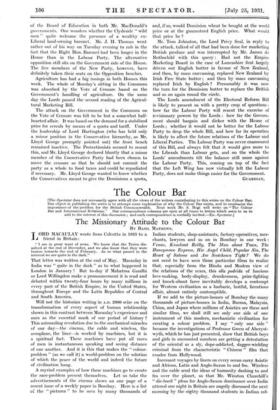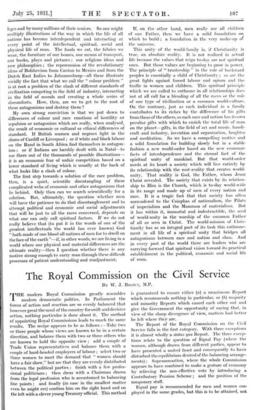The Colour Bar
[The Spectator does not necessarily agree with all the views of the writers contributing to this series on the. Colour. Bar; Our object in publishing the series is to attempt some explanation of why the Colour Bar exists, and to emphasize the importance of the problem for the British Commonwealth. Next week Mr. S. Magi will writs on "The Colour Bar and International Relations." Our correspondence columns are open at all times to letters which seem to us to add to the interest of this discussion ; and such correspondence is cordially invited.—En. Spectator.]
The Missionary Attitude to the Colour Bar
BY BASIL MATHEWS.
TA friend in ACABUrLitaAiYn wrote from Calcutta in 1835 to a
" I am in great want of news. We know that the Tories dis- solved at the end of December, and we also know that they were beaten towards the end of February. As to what passed in the interval we are quite in the dark."
That letter was written at the end of May. Macaulay in India was " quite in the dark " as to what happened in London in January ! But to-day if Mahatma Gandhi or Lord Willingdon make a pronouncement it is read and debated within twenty-four hours by many millions in every part of the British Empire, in the United States, throughout Europe and the Latin Republics of Central and South America.
Will not the historian writing in A.D. 2000 seize on the transformation of every aspect of human relationship shown in this contrast between Macaulay's experience and ours as the essential mark of our period of history ? This astounding revolution due to the mechanical miracles of our day—the cinema, the cable and . wireless, the aeroplane, the liner—is worked by machines, but it is a spiritual fact. These machines have put all races of men in instantaneous speaking and seeing distance of one another. • And it is this that makes the " colour- problem " (as we call it) a world-problem on the solution of which the peace of the world and indeed the future of civilization hang.
A myriad examples of how -these machines go to create the race-problem present themselves. Let us take the advertisements of the cinema shows on one page of -a recent issue of a weekly paper in Bombay. Here is a-list of the ".pictures " to be seen by many thousands of Indian students, shop-assistants, factory-operatives, mer- chants, lawyers and so on in Bombay in one week : Venus, Knockout Reilly, The Man about Town, The Honeymoon Express, His Angel Child, Popular Sin, The Heart of Salome and Are Scotchmen Tight? We do not need to have seen those particular films to realize that, especially from the Hindu and Moslem view of the relations of the sexes, this olla podrida of luscious love-making, body-display, drunkenness, prize-fighting and knock-about farce inevitably develops a contempt for Western civilization as a barbaric, lustful, licentious affair, almost entirely contemptible.
If we add to the picture-houses of Bombay the many thousands of picture-houses in India, Burma, Malaysia, China, and Japan where millions of Asiatics see these and similar films, we shall 'still see only one side of one instrument of this modern, mechanistic civilization for creating a colour problem. I say " only one side " because the investigations of Professor Green of Aberyst- wyth, which he has just presented, show that British boys and girls in uncounted numbers are getting a detestation of the oriental as a sly, dope-addicted, dagger-wielding criminal from the characteristic " Chinese " film that exudes from Hollywood.
Incessant voyages by liners on every ocean carry Asiatic and African, Latin and Anglo-Saxon to and fro.- Wireless and the cable send the ideas of humanity dashing to and fro over the planet, so that Mr. Winston Churchill's " die-hard-" pleas for Anglo-Saxon-dominance over-India uttered one night in Britain are angrily discussed the next morning -by- the eighty- thousand . students in- Indian_ col- leges and by many millions of their seniors. So one might multiply illustrations of the way in which the life of all nations has become interdependent and interacting at every point of the intellectual, spiritual, social and physical life of man. The foods we eat, the fabrics we wear, the furniture of our homes, our means of transport, our books, plays and pictures ; our religious ideas and new philosophies ; the repercussion of the revolutionary ideas of Bolshevism from Canton to Mexico and from the Dutch East Indies to Johannesburg—all these illustrate vividly the fact that what we call the " colour problem " is at root a problem of the clash of different standards of civilization competing in the field of industry, interacting in the field of morals and creating a whole series of discomforts. How, then, are we to get to the root of these antagonisms and destroy them ?
My own strong conviction is that we put down to differences of colour and race emotions of hostility or repulsion or antagonism which are really, when analysed, the result of economic or cultural or ethical differences of standard. If British seamen and negroes fight in the slums of Cardiff or Liverpool ; or if white and black labour on the Rand in South Africa find themselves in antagon- ism ; or if Indians are harshly dealt with in Natal—to use three out of the thousands of possible illustrations— it is an economic fear of unfair competition based on a lower standard of living which is usually at the back of what looks like a clash of colour.
The first step towards a solution of the race problem, then, is a quiet, scientific disentangling of these complicated webs of economic and other antagonisms that lie behind. Only then can we search scientifically for a solution. But, ultimately, the question whether men will have the patience to do that disentanglement and to attempt political and economic and social adjustments that will be just to all the races concerned, depends on what one can only call spiritual factors. If we do not really believe that (to put it in the words of one of the greatest intellectuals the world has ever known) God " hath made of one blood all nations of men for to dwell on the face of the earth "—if, in other words, we are living in a world where our physical and material differences are the ultimate reality—then 1 question whether there is any motive strong enough to carry man through these difficult processes of patient understanding and readjustment. If, on the other hand, men really are all children of one Father, then we have a solid foundation on which to build ; a foundation in the very make-up of the universe.
This unity of the world-family is, if Christianity is true, an absolute reality. It is not realized in actual life because the values that reign to-day are not spiritual ones. But those values are beginning to grow in power. The principle of " trusteeship " in the rule of backward peoples is essentially a child of Christianity ; so are the great fights against forced labour and opium and the traffic in women and children. This spiritual principle which we are called to enthrone in all relationships does not at all call for a blending of all the races or the rule of one type of civilization or a common world-culture. On the contrary, just as each individual in a family contributes to its riches by the difference of his gifts from those of the others, so each race and nation has its own peculiar gifts with which to enrich the total life of man on the planet—gifts, in the field of art and music, handi- craft and industry, invention and organization, laughter and meditation. So we have a compelling motive and a solid foundation for building slowly but in a stable fashion a new world-order based on the new economic facts of interdependence and the eternal fact of the spiritual unity of mankind. But that world-order needs at its heart a society which will live entirely by its relationship with the root-reality that creates world- unity. That reality is God, the Father, whom Jesus Christ revealed. The society that exists by its relation- ship to Him is the Church, which is to-day world-wide in its range and made up of men of every nation and race. It is a tragic fact that that society has often surrendered to the Caiaphas of nationalism, the Pilate of imperialism and the Mammon of -materialism. But it has within it, immortal and indestructible, the seed of world-unity in the worship of the common Father of all as seen in Christ. The world-mission of Chris- tianity has as an integral part of its task this enthrone- ment in all life of a spiritual unity that bridges all antagonisms between race and nation and class. And in every part of the world there are leaders who are carrying forward that spiritual vision toward its practical establishment in the political, economic and social life of man.











































 Previous page
Previous page